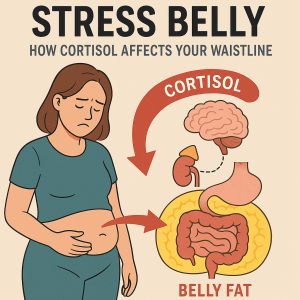Stress Belly: How Cortisol Affects Your Waistline
Have you ever noticed that no matter how hard you try to eat clean or exercise, your belly fat just won’t budge — especially during stressful times? You might be dealing with what’s known as a stress belly.
This frustrating phenomenon isn’t just about calories — it’s about hormones, particularly cortisol, your body’s main stress hormone. In this article, we’ll unpack the science behind how cortisol affects your waistline, why stress leads to abdominal fat, and what you can do to fix it naturally.
What Is a “Stress Belly”?

A stress belly refers to excess fat that accumulates around the abdomen due to chronic stress and elevated cortisol levels. Unlike other types of weight gain, stress-related belly fat tends to be firm, deep, and centered around the waist, indicating a buildup of visceral fat — the type that surrounds internal organs.
How Stress Impacts Your Body
When you’re under stress, your body activates the “fight-or-flight” response — a survival mechanism that releases hormones like adrenaline and cortisol. While this reaction is helpful in emergencies, prolonged stress keeps cortisol levels high, altering how your body stores fat and regulates appetite.
Understanding Cortisol: The Stress Hormone
Cortisol’s Normal Function
Cortisol is produced by your adrenal glands and plays a vital role in:
-
Managing blood sugar levels
-
Controlling inflammation
-
Regulating metabolism
-
Supporting memory and alertness
In small doses, cortisol helps you stay focused and energized.
When Cortisol Becomes a Problem
When stress becomes chronic — from work, relationships, or lack of sleep — your body continuously releases cortisol. Over time, this disrupts metabolism, slows fat burning, and promotes fat accumulation in the belly area.
The Science Behind Stress Belly
Cortisol and Fat Storage

Cortisol increases appetite and signals your body to store energy — usually as abdominal fat, since this area has more cortisol receptors. This is why stressful periods often lead to increased cravings for sugary, high-fat foods and gradual belly growth.
The Role of Insulin and Blood Sugar
High cortisol raises blood sugar levels, which causes insulin spikes. When insulin remains high, your body can’t burn fat effectively, creating a cycle of stress → high blood sugar → more belly fat.
Sleep, Hunger, and Hormonal Imbalance
Chronic stress also affects hunger hormones:
-
Leptin (satiety) decreases → you feel less full.
-
Ghrelin (hunger) increases → you crave more food.
Combine that with poor sleep, and your body stores more fat than it burns.
Symptoms and Signs of a Stress Belly
Physical Indicators
-
A round, firm midsection even when the rest of your body is lean
-
Bloating and digestive discomfort
-
Fat that feels deeper and harder than typical subcutaneous fat
Behavioral and Emotional Indicators
-
Frequent stress or anxiety
-
Emotional eating or carb cravings
-
Fatigue, poor sleep, or mental fog
If this sounds familiar, cortisol may be influencing your waistline more than you realize.
Causes and Triggers of Elevated Cortisol
Chronic Work Stress
Modern life keeps us “switched on” 24/7 — emails, deadlines, notifications. This constant state of alertness keeps cortisol elevated all day.
Poor Sleep and Overstimulation
Exposure to blue light from screens and late-night caffeine can suppress melatonin, making it harder to sleep — and causing cortisol to spike overnight.
Poor Nutrition and Dieting Mistakes
Skipping meals, crash diets, or overeating sugar all stress your metabolism. When your body senses starvation or instability, it releases even more cortisol to preserve energy.
How to Reduce Cortisol and Lose a Stress Belly
Nutrition That Lowers Cortisol
-
Eat balanced meals regularly — include protein, healthy fats, and complex carbs to keep blood sugar stable.
-
Focus on anti-inflammatory foods like leafy greens, salmon, nuts, and olive oil.
-
Cut down on caffeine and refined sugar, which overstimulate cortisol release.
-
Stay hydrated — even mild dehydration raises cortisol.
👉 Try a cortisol-lowering breakfast: Greek yogurt, berries, chia seeds, and almonds.
Exercise That Helps (and Hurts)
-
Best: Walking, yoga, pilates, swimming, and strength training — all reduce cortisol while burning fat.
-
Avoid overtraining: Excessive cardio or HIIT can actually raise cortisol, especially in women over 40.
Balance intense workouts with recovery days and deep breathing exercises.
Sleep, Mindfulness, and Stress Control
-
Sleep 7–8 hours per night. Cortisol drops naturally during deep sleep.
-
Practice mindfulness — even 10 minutes of meditation lowers cortisol levels.
-
Unplug daily — reduce screen time and reconnect with nature.
-
Deep breathing activates the parasympathetic system, signaling the body to relax.
Myths About Stress Belly and Cortisol
| Myth | Truth |
|---|---|
| “Cortisol only affects women.” | Both men and women experience cortisol-related belly fat. |
| “Cutting calories is the best fix.” | Severe restriction increases cortisol and slows metabolism. |
| “You can’t control cortisol naturally.” | Lifestyle and diet changes can significantly reduce cortisol levels. |
| “Exercise always lowers stress.” | Over-exercising can elevate cortisol and cause belly fat retention. |
When to Seek Medical Help
If your belly fat is accompanied by chronic fatigue, irregular menstrual cycles, high blood pressure, or anxiety, you might have a cortisol imbalance or adrenal fatigue. Consult a doctor or endocrinologist for hormone testing (saliva or blood cortisol tests).
FAQs About Stress Belly
1. Can stress alone cause belly fat?
Yes, chronic stress elevates cortisol, which directly promotes abdominal fat storage.
2. How long does it take to lose a stress belly?
With consistent lifestyle changes, most people see improvement in 8–12 weeks.
3. Can yoga really reduce cortisol?
Yes — research shows yoga lowers cortisol levels and improves insulin sensitivity.
4. Are stress bellies permanent?
No. They are reversible through lifestyle, nutrition, and hormonal balance.
5. Is cortisol higher in the morning?
Yes. It peaks naturally early in the day to help you wake up, then declines by evening.
6. Can supplements help with stress belly?
Magnesium, omega-3s, and ashwagandha may help lower cortisol — but always consult a doctor first.
Conclusion: Balance Your Mind, Flatten Your Belly
A stress belly is your body’s way of saying it’s overwhelmed — not just physically, but hormonally. The key to flattening your belly isn’t another crash diet; it’s about restoring balance to your body and mind.
By managing cortisol through mindful nutrition, regular exercise, proper sleep, and stress control, you can reclaim your waistline — and your overall health.
👉 Learn more from Harvard Health: Understanding Stress and Hormones.


